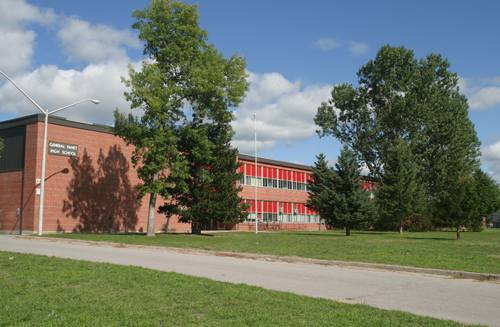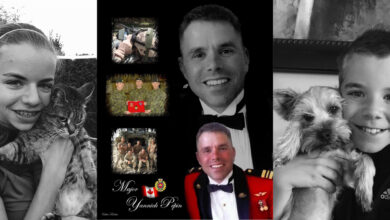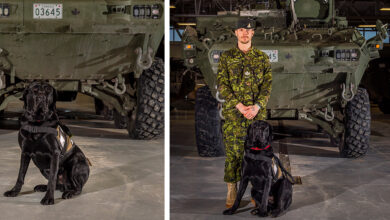Best of CMF Magazine
DND School Board
 A reminder of decades passed will come to an end this fall when General Panet High School in Petawawa, ON closes its doors for last time. General Panet High School was one of the last high schools left on a base that was established by the Department of National Defense (DND).
A reminder of decades passed will come to an end this fall when General Panet High School in Petawawa, ON closes its doors for last time. General Panet High School was one of the last high schools left on a base that was established by the Department of National Defense (DND).
Originally established in 1958, General Panet High School was a quintessential embodiment of schools that was a part of the DND’s nationwide school system in the late 20th century. These schools personified the military spirit for young children while establishing close bonds between children all used to moving from base to base.
“Panet is the best kept secret of the county. It’s in a military environment and the children are more respectful, there are fewer problems and there’s a greater sense of camaraderie amongst the staff…kids knew each other from previous postings,” recalls Bryon Morris a former student and teacher at Panet High School.
It wasn’t until the end of World War II that the education of military children was considered a responsibility of DND. After months of debate and discussion between the three service branches and DND, the order to establish schools for children of military members was approved in April 1947. The order called for schools to be built on bases for children that did not have access to any other schools. A provision was also made for reimbursement of the non-resident school fees that some required to pay to the local boards.
The first of these schools began opening its doors in September 1947 with a reported enrollment of 1,174. By March of 1958 eighteen schools were established nationwide with an enrollment of 2,600.
The establishment of these schools went hand-in-hand with building permanent married quarters (PMQ) for bases of all three service branches. This created a community for military families and it is reported that it encouraged more young men to join the military.
A common theme for many of the schools was the environment of camaraderie and understanding for what a child of a military parent may be experiencing. Gary Servis, another former student and teacher at Panet High School, pointed out that often times, the curriculum would integrate information about places a parent may be deployed to.
“You would integrate more into your curriculum about where their parents were. Whether it was Bosnia or Afghanistan, or Haiti or whatever was happening in the world, and their parents were participating in it, I think you would fill them in on what was going on more than civilian children,” explained Servis.
Events like Remembrance Day had a special significance and Servis recalls how visitors would often be stunned to see the children attending the ceremonies so quietly and diligently.
“We make a pretty big deal of Remembrance Day. And a lot of people come to these ceremonies and they are just completely floored by the fact that these kids will sit there for an hour and a half and not say a word,” said Servis.
The military also provided support to schools on base whether it was by donating giant air conditioners or putting on artillery relay shows.
Since the school was closed to the general public and civilians needed a pass to enter the base, Servis remembers how the base was often considered mysterious by the local people, a mystery that remained even after the schools were open to the public.
“There was this mystique. The base was this secret place. You couldn’t get on it and finally when it opened to the public there was still some trepidation about what was going on at the base and sending your children there,” noted Servis.
Strategic assessments and budget cuts forced DND to turn the schools over to provincial boards in the early 1990s. This allowed both civilians and military children who did not reside on base, a choice to attend these schools. In the decades since the transition, many schools established on bases nationwide have closed due to decreasing enrollments due to newer public schools.
In September 1991, General Panet along with two elementary schools became part of the Renfrew County School Board. Many students and teachers felt very little change during the transition besides the growing enrollment allowing them to establish larger sports teams.
“The school still had a strong military flavor to it. Panet was still Panet…the heart of the school was still the same,” said Morris.
General Panet remained open for several decades after the transition but the building began to deteriorate and in 2008 the local board was promised funding by the Ministry of Education. This new school, Valour, will accommodate all three schools that were on base. The new school is located in the town of Petawawa.
The school was set to open in September 2014, but it has been pushed back to October. Servis is among many who do not mind spending a few extra weeks in General Panet.
“We had our big goodbyes in June we had a big assembly and we knew it was going to get torn down by the end of September or October. So now that it’s going to be open for another 5 or 6 weeks I’m not all that disappointed. Even some of the kids are excited that they get to go Panet for a little longer. And that shows you the effect Panet has,” said Servis.
Though many former and current students are sad to the see the old school go, there is also much excitement for the new school.
“They are delighted to be getting a new school. We’ve only heard positive feedback. They’re excited because its state-of-the-art and it will be the biggest in our board. There’s a lot of excitement around it,” said Stephanie Giesebrecht Executive Assistant to the Director of Communications of Renfrew County School Board.
General Panet produced many notable graduates including Tommy MacDonald, the bass player for the band Hedley; Tony Grace, CTV news anchor and Chris Jefferies, the Olympic cross-country skier.










